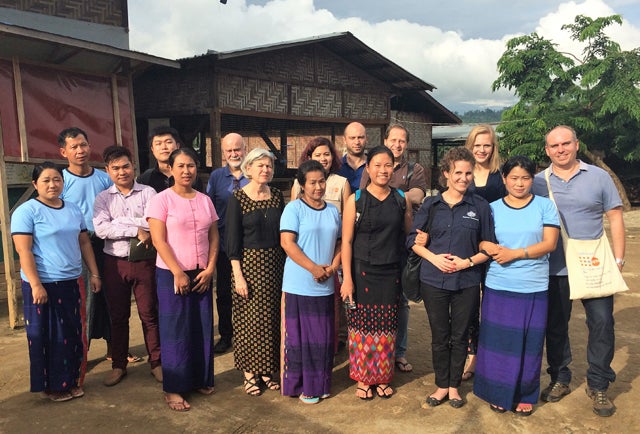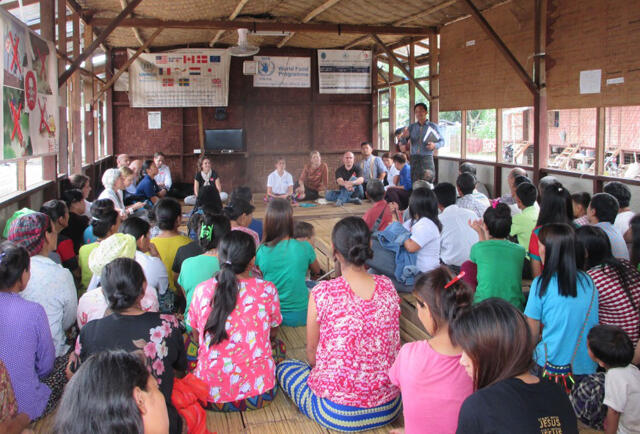On 19-21 June, supporters of UNFPA’s Women and Girls First programme joined a UNFPA team on a visit to UNFPA activities in Kachin, Myanmar. During the visit, donors from Australia, Finland, Italy, and Sweden met women and girls who have been displaced by armed conflict in this northern part of Myanmar, which borders China and India.
When families fled their villages for camps in safer areas, they lost their livelihoods. Men are forced to seek work away from home, many of them heading for the infamous Hpakant jade mines. Their prolonged absence has a profound effect on the safety and security of women and girls, and the threat of violence, including sexual violence, is a constant fear. Girls may spend long periods alone and without protection in their shelters, with their fathers absent and their mothers out collecting firewood.
High acceptance of domestic violence
The common threat of violence, however, is domestic violence. While domestic violence is often hidden, it becomes more visible to the community when families live in cramped conditions and walls are thin. According to recent data, 59.7 per cent of women, and 57.1 per cent of men in Kachin believe that a husband can be justified in beating his wife for reasons such as not looking after the children or going out without permission. This is significantly higher than the national average at 51 per cent for women, and 49 per cent for men. 23.9 per cent of women in Kachin have experienced physical violence since the age of 15. This is significantly higher than the national average of 15.4 per cent.
The donor delegation visited a UNFPA supported Women and Girls Centre in Myitkyina. While the centre focuses on displaced people who live in nearby camps, it also welcomes women and girls from the host community. In the centres, women and girls who have been abused receive help to get to hospital for medical assistance. Emergency treatment is particularly important in rape cases, where treatment started within 72 hours can prevent both pregnancy and infection, including HIV. The centres also offer counselling and psychosocial support to help deal with the trauma. In additional vocational training programmes are provided.
Working together to integrate services for women and girls
“Concerted efforts are now needed to strengthen the integration of the two critical components of the Women and Girls Centre model, which are gender-based violence, and sexual and reproductive health and rights. We owe this to women and girls for their protection and the hope for a better and more equal future. Their voices, as well as those of young people, are integral to peacebuilding in the community. We are glad to see that boys and men are getting involved in promoting gender equality and ending all manner of gender-based violence”, said Tomas Lundström of the Swedish International Development Cooperation Agency.
“There is a ready opportunity for local authorities to capitalize on the fact that social welfare and health services come under a single Department of Social Affairs. This gives an open and ample opportunity for teams to work together on having an integrated approach to information and services on gender-based violence and sexual and reproductive health and rights”, said Janet Jackson, UNFPA Country Representative.
Sexual and reproductive health for displaced youth
There is also an urgent need for strengthened sexual reproductive health services, including maternal health care and family planning. Many conflict-affected areas lack skilled health personnel and have insufficient supplies. Women and girls, especially adolescents and young people, face considerable obstacles when it comes to situations of gender-based violence and the need for immediate access to sexual and reproductive health information and services. In a meeting with youth representatives, a young woman also stressed the importance of targeted interventions for young people: “I live in a camp, and there I participated in a youth training on sexual and reproductive health and gender-based violence. This was the first time in my life that I received education on these topics. Most young people have no knowledge on these issues at all.”
“In listening to public stakeholders and civil society organizations of Kachin, and Youth organization as well, we appreciate how the time is now to manage the Women and Girls First Programme in light of sustainability, and with a social inclusion perspective. In other words, it is time to expand the approach to the host community in coordination with the Government and with the help of civil society. This in order to achieve not only gender-based violence prevention and response for both displaced people and community members, but also as a way to include harmony and reconciliation in the approach”, said Maurizio Di Calisto from the Italian Aid Cooperation.

“We as women can start making a change”
During the donor visit, women from the nearby IDP camp attended an information session on family planning. One of the women shared the challenges she is facing as a widow, being the head of the family, and living in an IDP camp: “The Women and Girls Centre provides a safe space for me and the information shared here on gender-based violence and reproductive health is very valuable.”
“It was heartening to see the motivation that the session inspired in women at the Women and Girls Centres that are run by Metta Development Foundation. These centres have taken shape over the last two years. It was inspiring to hear how these have positively affected the lives of women and girls. The centres are a safety valve in an otherwise uncertain and dependent existence that seems unending, with opportunities too few to grasp despite untapped human potential and resources”, said the Australian Embassy’s Esther Perry.
Addressing the women and girls who attended the information session, Silja Rajander of the Finnish Embassy said: “Gender equality is critical for peacebuilding and development. I encourage you to share the information you receive here at the Women and Girls Centre with family members and friends. If each and every one of you shares this information we do not only reach you who are present here today – we can reach hundreds of women and girls. If they in turn share this, we can reach thousands, and this is how we as women can start making a change.”
“We must listen to the voices of local people”
Janet Jackson, UNFPA Country Representative, concluded the visit by stressing the importance of genuine engagement with local communities:
“More needs to be done to build the awareness of women and girls, especially adolescents and young people, on their rights. It is equally time for duty bearers, including local authorities, religious, political and community leaders, to champion well-intended national policies and services at the local level. Development, humanitarian and peacebuilding efforts need the strong engagement and voices of the local people. They are not feeling heard.”


